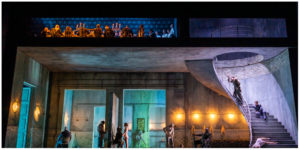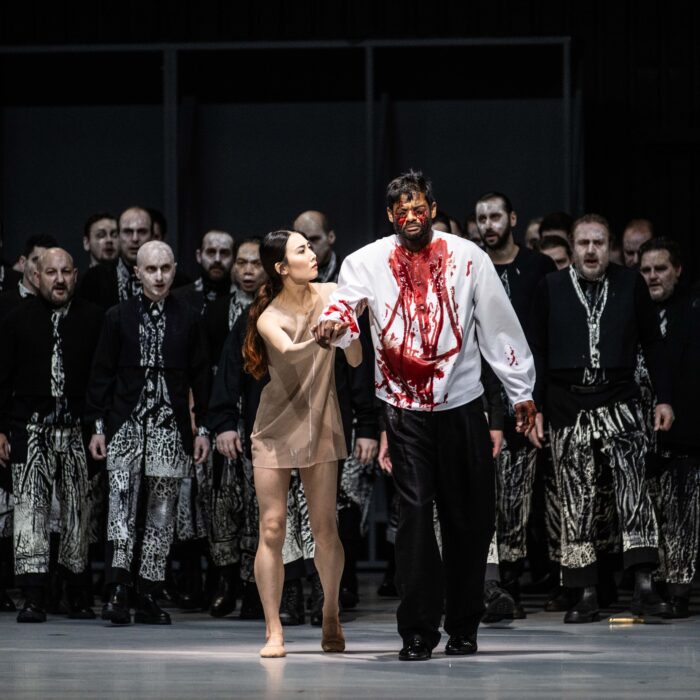
Royal Opera House 2022-23 Review: Salome
Malin Byström Stars in Strauss’ Unnerving Psychodrama
By Benjamin PoorePhoto credit: ROH Salome © Tristram Kenton
David McVicar’s production of Richard Strauss’ “Salome”, designed by Es Devlin, was first seen in 2008, and is receiving its fourth revival at Covent Garden with Bárbara Lluch at the helm. It opened the night following the death of Queen Elizabeth II – “Don Giovanni” the night before was cancelled in the circumstances – which meant the gold ‘ER’ insignia on the red house curtains had been dutifully removed ahead of the performance; a performance of the National Anthem prefaced the performance. All a rather strange prelude to an opera about a deeply dysfunctional bunch of aristocrats.
McVicar sets Strauss’ one-act music drama in the fascist Italy of the 1940s, as the war grinds to its hopeless end, drawing directly on the scenography and scenario of Pier Paolo Pasolini’s disturbing 1975 horror flick “Salò”. Like Oscar Wilde’s play on which Hedwig Lachmann’s libretto is based, Pasolini’s film was banned in the UK. As a production concept sketches a relationship between politics, sadism, and perversion – a sense that orgiastic violence and exploitation are hardwired into the fascist mentality, showing what happens when the screws of bourgeois propriety are loosened by war and authoritarianism, which allow you to treat people as things.
A Look Can Kill
It is an opera about the tyranny of looking – ‘Wie schön ist die Prinzessin Salome heute nacht?’ is the first line of the piece – and characters are frequently chided that a look can kill. Herod must see Salome dance, and his wife notices the sickening interest he takes in the teenager; Narraboth can’t stop looking at his mistress, and falls for the promise of a smiling look from her.
McVicar plays on our love of looking too, as an audience, and the graphic production concludes with a devastating stage picture of the naked executioner – a towering, panther-like Duncan Meadows, who McVicar reportedly recruited when he was working as a living statue in the West End – covered head to toe in blood carrying Jochanaan’s severed head, blood dripping everywhere, across the stage, to the sound of one the most brutal orchestral surges in all of Strauss’ music. The acres of naked flesh in previous outings seem to have receded in this revival, but there is still plenty of gore and brutality, and remind one of those days when McVicar was leading the way in arresting and novel interventions into the operatic repertory.
Fun, truly, for the whole family. Upstairs from the kitchen/meat locker that makes up the stage a dinner party goes on, at which seemingly nothing is off limits. Salome prefers to spend her time below stairs with soldiers, cooks, waiters and slaves – not out of some misplaced sympathy, one imagines, but presumably because she despises the hypocrisy of Herod’s dinner guests and the suffocating petty squabbles of men at supper.
The production’s strength lies in these moments of visual spectacle, which turn the pleasure and repulsion of looking on horrors back on the audience. This is aided by the stark moonlight that illuminates Salome (from Wolfgang Göbbel), covered in blood, sprawled on the stairs, as she caresses Jochanaan’s head, or the equally striking opening tableau. McVicar wrongfoots the usual expectations in the dance of the seven veils, where instead of smoldering seduction we get a psychodrama of childhood abuse and exploitation, where the psychic threads grow increasingly frayed in line with the wildness of Strauss’ score.
The overall vision is compelling and succeeds for the most part thanks to strong conducting from Alexander Soddy and highly engaged vocal performances. But the production feels slacker – less nasty, in sum – than on its previous outings, with movement seeming looser and the atmosphere one of tense poise rather than razor-wire fright; the reins might be pulled a bit more taut as the run goes on.
Mixed Bag
Much hinges on Malin Byström’s performance of the title character, which she sang to great acclaim on the production’s last outing. For the very most part the performance is electric. Her wily indifference in the face of Herod’s offers of kingdoms and jewels is chillingly understated, and sung with remarkable coolness (a great glimpse of the character’s ability to survive, by guile and manipulation, in this sickening family. Likewise her handling of Narraboth, sung with puppy-dog plangency and vulnerability by Thomas Atkins, chills to the bone in its flirtatious calculation.
There was less heft and focus in the lower register than her last outing in the role, with the blood-curdling low g-flat on “Todes” not quite taking us into the place of horror and mystery that moment implies. But the concluding recitatives had a crystalline fragility and sharpness that gave the final scene huge impact.
The object of her affection – though that is certainly the wrong word – was Jordan Shanahan’s Jochanaan. He certainly had no difficulty finding the requisite squillo in the great vaulting phrases in his opening vocal salvo, delivered with considerable panache and deftness. He was strongest in the moments of prophetic rage – his top E on “Verflucht” had a dark, tensile strength – even if his performance pointed less to the holy man’s charisma than others in this house have done so; t here was scope for more tenderness and spiritual ardor in the sequence where he tells Salome to seek out Christ at the sea of Galilee.
Herod was sung by John Daszak, who moved well from complacent to desperate across the second half of the opera, cornered by both daughter and wife. The vocal mannerisms played well into the figure of a leader whose hold on power – and reality – is increasingly fragile and may ultimately prove illusory. But high notes were frequently frayed and the sound stretched; he may be a bad guy, but there is still scope for finely-honed singing, despite Strauss’ demanding writing. Katarina Dalayman gave an imperious, devious performance as Herodias, with traces of the same maniacal brilliance she so admires in her daughter reflected in the voice – powerful, condescending, dismissive, and full of steel.
“Salome” is defined by its central performance, albeit one that is articulated through an extensive ensemble cast, which proved strong. Annika Schlicht’s Page had a brittle intensity in a performance that set the show on edge from the top, and sang with nervy brightness. Simon Shibambu and Simon Wilding made the two soldiers more than bit parts, with well-articulated relationships to their prisoner.
James Platt’s step-out moment as the First Nazarene was a moment of beautiful lyrical repose, the strange promise of moral authority and redemption carried in his unctuous legato delivery. The quintet of Jews – Paul Curievici, Michael J. Scott, Aled Hall, Alasdair Elliott, and Jeremy White – provided a blackly comic interlude, squabbling about theology while the world descends into horror around them (Curievici’s petulant little jump of frustration was a calculated burst of absurd levity).
Alexander Soddy makes his Royal Opera House debut. Many of Strauss’ pungent details were well seized – the coiled bassoon solos of the post-Jochanaan orchestral interlude, for a start, and a nauseous squeak from the high double bass as the executioner set to his offstage work. Attacks were fierce and staccatos pointed, but the broader moments wanted for clarity and transparency, with horns, woodwinds and strings seemingly at sixes-and-sevens in the great interlude that introduces Jochanaan’s entrance, with the prevailing effect being a smudge rather than gaudy, glittering glamour of Strauss’ score. The Dance of the Seven Veils romped along though, and Soddy squeezed on Strauss’ daring bitonal chord at the climax of the opera for all it was worth.
Not an unqualified success, but still a bracing evening of opera.


